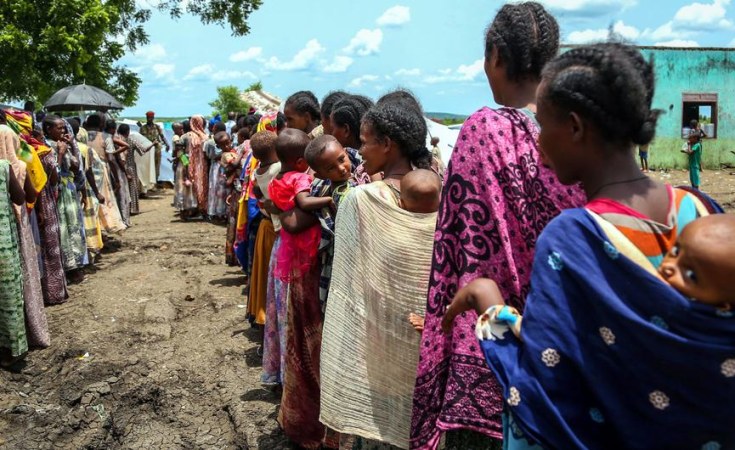The refugees accuse Rwanda's government and the UNHCR of starving them to force them to return home. The UN has rejected the accusation, saying it is doing its best to provide aid during difficult economic times.
In a refugee camp in Rwanda's Eastern Province, Burundian children enjoy playing innocently, but behind their cheerful faces lie untold stories of suffering.
Food rations have not only been reduced in the Mahama Refugee Camp near the Tanzanian border, but they have also been delayed. It can take up to two to three months, one distressed camp resident told DW.
"A person is supposed to get 3 kilograms of maize and beans a month, but currently we are not receiving this ration," said the Burundian, who asked to remain anonymous.
Five dollars to last a month?
"Now we are given $5 (€4.65) to last us a month," he said, adding that sometimes it is reduced to $3 for food. "I last got it the day I arrived in this camp, and it's a long time ago when I got maize and beans."
He has turned to playing and listening to Burundian music for solace in his two-room house. But, he said, the situation is even worse for families whose children have to go hungry and depend on handouts from good Samaritans, which was never previously the case.
Children bearing brunt
"It's not only an individual case. There are even families I know with over eight children who go hungry without help. I don't know why they have reduced it. Sometimes it takes a week without food for children," he said.
According to Lilly Carlisle, UNHCR spokesperson in Rwanda, the refugee agency has not reduced food rations or the monthly upkeep fee despite the challenges they face in trying to ensure the welfare of refugees.
"Food assistance that is provided to refugees in Rwanda by the World Food Program [WFP] has remained constant," Carlisle stressed, adding that it has not reduced despite the rising cost of living. "Food inflation doesn't mean the real value of the assistance has lessened."
Are refugees being deliberately starved?
Carlisle also dismissed the allegations that the Burundian refugees are deliberately being starved to force their return to Burundi. Instead, she told DW that the decision for any refugee to return remains a personal choice.
"Any claims that assistance to refugees is being reduced as a mechanism to force them to return home is completely incorrect," the UN official said. "Burundian refugees returning from Rwanda remains a voluntary choice based on individual circumstances, and UNHCR we are here to support refugees throughout this process and provide them with information, counseling and assistance."
Efforts by DW to get a comment from Rwanda's deputy government spokesperson, Alain Mukurarinda, about the situation were futile as he has yet to respond to our questions.
Why have Burundians fled to Rwanda?
Since 2015, more than 300,000 refugees from Burundi have fled to neighboring countries, such as Rwanda and Tanzania.
They were displaced following a political crisis under the late President Pierre Nkurunziza. After serving two terms, Nkurunziza refused to step down, triggering months of protests.
Rwandan security agencies responded with heavy-handedness and extra-judicial killings.
Rights groups say the conflict has killed more than 1,700 people since 2015 and displaced hundreds of thousands more.
Following the death of Nkurunziza in June 2020, many Burundian refugees have returned home willingly. However, over 30,000 Burundian refugees are still in Rwanda. And nearly 150,000 remain in Tanzania, according to the UN.
They often complain of stigmatization and being coerced by authorities to return.
Edited by: Keith Walker


